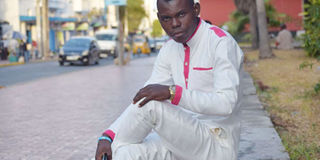Giving a trendy sound to traditional ohangla music

Ohangla star Elisha Okuku, best known as Mtoto wa Shule. He is changing the face of ohangla music by combining its rhythm with rumba tunes. PHOTO | JOSIAH MWANGI
What you need to know:
- The modernisation of ohangla tunes has led to the creation of music loved by people of all ages, and its dancing style changed.
- According to Simon Ndirangu, a local music producer, the current ohangla music is a sharp contrast from the code that guided it before its modernisation.
Ohangla artistes have been striving to change the face of the once traditional musical genre. Since the days when instruments like the drum, flute and lyres were the main ohangla accompaniments, digital emancipation has transformed the age old genre popular on the shores of Lake Victoria.
The coming of Elisha Okuku, best known with his stage name as ‘Mtoto wa Shule,’ has given ohangla rhythm a touch of rhumba, a move permitting a fresh allure that attracts young people to enjoy a genre that originally had a fast tempo enjoyed by the aged.
Okuku, who has released his third album, says his new style is meant to attract young fans who have broken away from the past in terms of listenership. “I wanted to break from the normal in the ohangla genre because our audience is growing younger and restless at heart,” says Okuku.
While the traditional system of the music had an ensemble that consisted of a drummer with eight cowhide drums, another with a shoulder-slung monitor lizard-skin drum, a flute player and a nyatiti player, the modern ensemble has guitars, keyboards and other electric musical accompaniments.
“In the traditional beats, the dancers vigorously gyrated their hips to the fast tempo, while the modern beat has three phases comprising a slower paced session like the rumba rhythm,” explains Okuku.
Technology has enabled musicians to fuse instruments like the synthesiser and guitars into ohangla, and basically doing away with its traditional element.
CAREER
In an interview with the Weekend, Okuku said he started his musical career in 2002 with ohangla star Odosh Jasuba before moving on to join another artist, Wanga Jakolando of the Ohangla Challenge Band. When he moved to Likoni at the Coast in 2013, he first became a pianist in a nightclub band before going solo.
His current album is doing well on the market, courtesy of a blend of rhumba and ohangla genres. The album, titled Kapesa Orumo (when you run out of money) has songs such as Nyiri Lore, Princess Jano, Toti Aluongi, Okech Mwalimu and Nyasego.
The band, composed of 16 members, recently got a boost when Ouma Wuod Ayieta, a skilled ohangla pianist with a long-standing experience, joined them last year. They are currently on a promotional tour of the band in Nairobi and Kisumu.
Changing the face of ohangla to suit modern listeners did not start with Okuku, pioneer ohangla musician David Ochieng’, best known as Daudi Jamigori, is undoubtedly the face behind modernisation of ohangla music.
Ochieng, who is credited with mentoring some of the genre’s great artistes like Onyi Papa Jey, Odongo Mayaka, Lady Moureen, Ouma Basement and Ken Wuod Alego, took the initiative to develop the rhythm of the music with modern accompaniments in 1992 together with Jack Nyadundo.
Nyadundo is well known for his traditional style of using instruments like the orutu instead of the keyboard that is widely used today. The Kisumu-based Nyamollo Traditional Band, formed in 2002 by Daudi, has been instrumental in churning out creative, and budding artists who have endeavoured to transform ohangla in various ways.
CHANGE
Of the current crop of musicians, Siaya-based artist Otieno Aloka is the most skilled in playing the orutu, the nyatiti and the flute. That notwithstanding, he has also demonstrated his flexibility to adopt to the technological changes in his latest compositions.
The modernisation of ohangla tunes has led to the creation of music loved by people of all ages, and its dancing style changed. According to Simon Ndirangu, a local music producer, the current ohangla music is a sharp contrast from the code that guided it before its modernisation.
“Previously, ohangla was deemed as traditional and didn’t find considerable airplay in radios and clubs. This is different today because ohangla bands have set base in big restaurants in Nairobi and other cities,” notes Ndirangu.
Traditionally, the music was played in funerals, weddings and other ceremonies. It carried lewd and uncensored lyrics which often brought the artists trouble with the authorities. In the 1980s, the then chief of West Alego in Alego Usonga in Siaya, banned the performance of ohangla within the location after one of his wives eloped with a physically challenged ohangla player.
Before embracing electronic musical accompaniment that targets a wider audience, musician Otieno Aloka had suffered a blow in his music career in the 1990s when local provincial administration banned his songs for promoting promiscuity.




